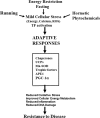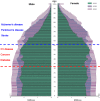Challenging oneself intermittently to improve health
- PMID: 25552960
- PMCID: PMC4267452
- DOI: 10.2203/dose-response.14-028.Mattson
Challenging oneself intermittently to improve health
Abstract
Humans and their predecessors evolved in environments where they were challenged intermittently with: 1) food scarcity; 2) the need for aerobic fitness to catch/kill prey and avoid or repel attackers; and 3) exposure to biological toxins present in foodstuffs. Accordingly, cells and organ systems acquired and retained molecular signaling and metabolic pathways through which the environmental challenges enhanced the functionality and resilience of the cells and organisms. Within the past 60 years there has been a precipitous diminution of such challenges in modern societies because of the development of technologies that provide a continuous supply of energy-dense processed foods and that largely eliminate the need for physical exertion. As a consequence of the modern 'couch potato' lifestyle, signaling pathways that mediate beneficial effects of environmental challenges on health and disease resistance are disengaged, thereby rendering people vulnerable to obesity, diabetes, cardiovascular disease, cancers and neurodegenerative disorders. Reversal of the epidemic of diseases caused by unchallenging lifestyles will require a society-wide effort to re-introduce intermittent fasting, exercise and consumption of plants containing hormetic phytochemicals into daily and weekly routines.
Keywords: brain function; exercise; hormesis; intermittent fasting.
Figures



Similar articles
-
The hormesis principle of neuroplasticity and neuroprotection.Cell Metab. 2024 Feb 6;36(2):315-337. doi: 10.1016/j.cmet.2023.12.022. Epub 2024 Jan 10. Cell Metab. 2024. PMID: 38211591 Review.
-
Intermittent living; the use of ancient challenges as a vaccine against the deleterious effects of modern life - A hypothesis.Med Hypotheses. 2018 Nov;120:28-42. doi: 10.1016/j.mehy.2018.08.002. Epub 2018 Aug 9. Med Hypotheses. 2018. PMID: 30220336
-
Hormetic Effects of Phytochemicals on Health and Longevity.Trends Endocrinol Metab. 2019 Jun;30(6):335-346. doi: 10.1016/j.tem.2019.04.001. Epub 2019 May 3. Trends Endocrinol Metab. 2019. PMID: 31060881 Review.
-
Safety and nutritional assessment of GM plants and derived food and feed: the role of animal feeding trials.Food Chem Toxicol. 2008 Mar;46 Suppl 1:S2-70. doi: 10.1016/j.fct.2008.02.008. Epub 2008 Feb 13. Food Chem Toxicol. 2008. PMID: 18328408 Review.
-
An Evolutionary Perspective on Why Food Overconsumption Impairs Cognition.Trends Cogn Sci. 2019 Mar;23(3):200-212. doi: 10.1016/j.tics.2019.01.003. Epub 2019 Jan 19. Trends Cogn Sci. 2019. PMID: 30670325 Free PMC article. Review.
Cited by
-
Redox Mechanisms in Neurodegeneration: From Disease Outcomes to Therapeutic Opportunities.Antioxid Redox Signal. 2019 Apr 10;30(11):1450-1499. doi: 10.1089/ars.2017.7321. Epub 2018 May 4. Antioxid Redox Signal. 2019. PMID: 29634350 Free PMC article. Review.
-
Effects of Intermittent Fasting, Caloric Restriction, and Ramadan Intermittent Fasting on Cognitive Performance at Rest and During Exercise in Adults.Sports Med. 2016 Jan;46(1):35-47. doi: 10.1007/s40279-015-0408-6. Sports Med. 2016. PMID: 26438184 Review.
-
Age and Chronicity of Administration Dramatically Influenced the Impact of Low Dose Paraquat Exposure on Behavior and Hypothalamic-Pituitary-Adrenal Activity.Front Aging Neurosci. 2017 Jul 14;9:222. doi: 10.3389/fnagi.2017.00222. eCollection 2017. Front Aging Neurosci. 2017. PMID: 28769783 Free PMC article.
-
The Link Between Energy-Related Sensations and Metabolism: Implications for Treating Fatigue.Front Psychol. 2022 Jun 21;13:920556. doi: 10.3389/fpsyg.2022.920556. eCollection 2022. Front Psychol. 2022. PMID: 35800955 Free PMC article. Review.
-
Notch signaling and neuronal death in stroke.Prog Neurobiol. 2018 Jun-Aug;165-167:103-116. doi: 10.1016/j.pneurobio.2018.03.002. Epub 2018 Mar 21. Prog Neurobiol. 2018. PMID: 29574014 Free PMC article. Review.
References
-
- Ahmed T, Gilani AH, Hosseinmardi N, Semnanian S, Enam SA, Fathollahi Y. Curcuminoids rescue long-term potentiation impaired by amyloid peptide in rat hippocampal slices. Synapse. 2011;65:572–582. - PubMed
-
- Ahmet I, Wan R, Mattson MP, Lakatta EG, Talan M. Cardioprotection by intermittent fasting in rats. Circulation. 2005;112:3115–3121. - PubMed
-
- Allsopp TE, Kiselev S, Wyatt S, Davies AM. Role of Bcl-2 in the brain-derived neurotrophic factor survival response. Eur J Neurosci. 1995;7:1266–1272. - PubMed
LinkOut - more resources
Full Text Sources
Other Literature Sources
Research Materials
Miscellaneous

